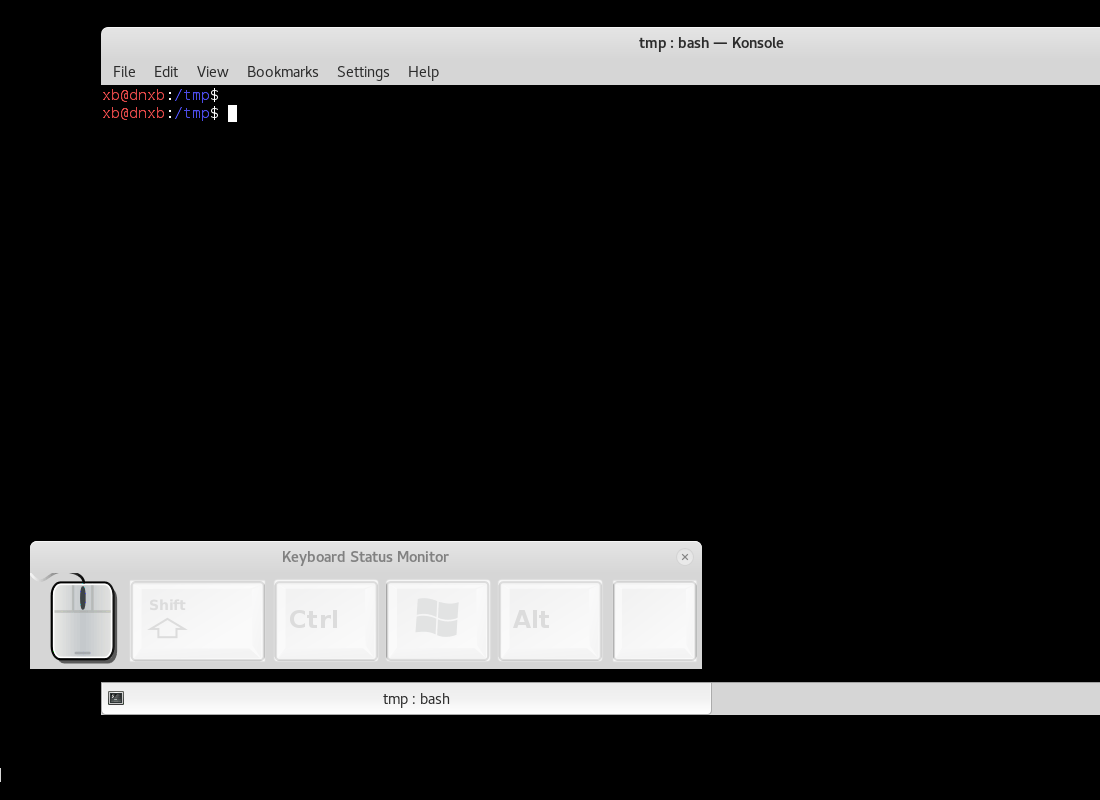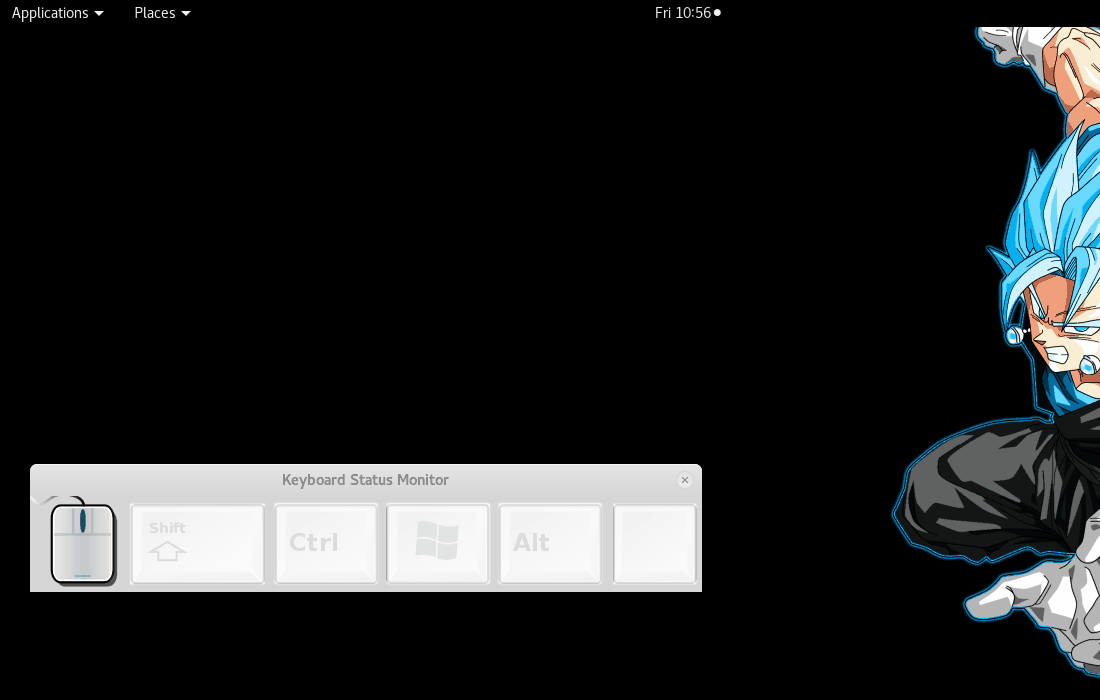Ho appena scritto questo in C :
#include <stdio.h>
#include <curses.h>
#include <time.h> //time(0)
#include <sys/time.h> // gettimeofday()
#include <stdlib.h>
void waitFor (unsigned int secs) {
//credit: http://stackoverflow.com/a/3930477/1074998
unsigned int retTime = time(0) + secs; // Get finishing time.
while (time(0) < retTime); // Loop until it arrives.
}
int
main(void) {
struct timeval t0, t1, t2, t3;
double elapsedTime;
clock_t elapsed_t = 0;
int c = 0x35;
initscr();
cbreak();
noecho();
keypad(stdscr, TRUE);
halfdelay(5); //increae the number if not working //adjust below `if (elapsedTime <= 0.n)` if this changed
printf("\nSTART again\n");
elapsed_t = 0;
gettimeofday(&t0, NULL);
float diff;
int first = 1;
int atleast_one = 0;
while( getch() == c) { //while repeating same char, else(ffff ffff in my system) break
int atleast_one = 1;
if (first == 1) {
gettimeofday(&t1, NULL);
first = 0;
}
//printf("DEBUG 1 %x!\n", c);
gettimeofday(&t2, NULL);
elapsedTime = (t2.tv_sec - t1.tv_sec) + ((t2.tv_usec - t1.tv_usec)/1000000.0);
if (elapsedTime > 1) { //hit max time
printf("Hit Max, quit now. %f\n", elapsedTime);
system("gnome-terminal");
//waitFor(4);
int cdd;
while ((cdd = getch()) != '\n' && cdd != EOF);
endwin();
exit(0);
}
if(halfdelay(1) == ERR) { //increae the number if not working
//printf("DEBUG 2\n");
//waitFor(4);
break;
}
else {
//printf("DEBUG 3\n");
}
}
if (atleast_one == 0) {
//gettimeofday(&t1, NULL);
t1 = t0;
}
gettimeofday(&t3, NULL);
elapsedTime = (t3.tv_sec - t1.tv_sec) + ((t3.tv_usec - t1.tv_usec)/1000000.0);
printf("Normal quit %f\n", elapsedTime);
if (elapsedTime > 0.6) { //this number based on halfdelay above
system("gedit &");
//system("xdotool key shift+left &");
//system("mplayer -vo caca -quiet 'video.mp4' &");
//waitFor(4);
}
else if (elapsedTime <= 0.6) {
system("xdotool key ctrl+shift+t &");
//waitFor(4);
}
int cdd;
while ( (cdd = getch() ) != '\n' && cdd != EOF);
endwin();
return 0;
}
Utilizzare showkey -aper ottenere il codice chiave di bind:
xb@dnxb:/tmp$ sudo showkey -a
Press any keys - Ctrl-D will terminate this program
^[[24~ 27 0033 0x1b #pressed F12
91 0133 0x5b
50 0062 0x32
52 0064 0x34
126 0176 0x7e
5 53 0065 0x35 #pressed Numpad 5, 5 is the keycode used in `bind`
^C 3 0003 0x03
^D 4 0004 0x04
xb@dnxb:/tmp$
Inserisci il keycode bind 5 e il suo comando (es. Run /tmp/.a.out) in ~ / .bashrc:
bind '"5":"/tmp/a.out\n"'
Nota che anche il codice chiave pertinente deve cambiare nel codice sorgente (anche il valore esadecimale può ottenere sudo showkey -adall'alto):
int c = 0x35;
Compilare con (output in /tmp/a.outnel mio esempio):
cc filename.c -lcurses
Dimostrazione:
Tastierino numerico 5, pressione breve per aprire una nuova scheda, pressione media per aprire gedit e pressione lunga per aprire gnome-terminal.

Questo non è direttamente applicabile in nessuna finestra su gnome desktop manager, ma penso che dovrebbe darti un'idea di come (difficile) implementarlo. Funziona anche in Virtual Console (Ctrl + Alt + N) e funziona in un emulatore di terminale (es. Konsole, gnome-terminal, xterm).
p / s: non sono un programmatore ac, quindi perdonami se questo codice non è ottimizzato.
[AGGIORNARE]
La risposta precedente funziona solo in shell e richiede focus, quindi penso che analizzare / dev / input / eventX sia la soluzione per funzionare nell'intera sessione X.
Non voglio reinventare la ruota. Gioco con evtestutility e ho modificato la parte inferiore di evtest.c con il mio codice:
int onHold = 0;
struct timeval t0;
double elapsedTime;
int hitMax = 0;
while (1) {
rd = read(fd, ev, sizeof(struct input_event) * 64);
if (rd < (int) sizeof(struct input_event)) {
perror("\nevtest: error reading");
return 1;
}
system("echo 'running' >/tmp/l_is_running 2>/tmp/l_isrunning_E &");
for (i = 0; i < rd / sizeof(struct input_event); i++) {
//system("date >/tmp/l_date 2>/tmp/l_dateE &");
if (ev[i].type == EV_KEY) {
if ( (ev[i].code == 76) ) {
if (!onHold) {
onHold = 1;
t0 = ev[i].time;
hitMax = 0;
}
if (!hitMax) { //to avoid hitMax still do the time checking instruction, you can remove hitMax checking if you think it's overkill, but still hitMax itself is necessary to avoid every (max) 2 seconds will repeatly system();
elapsedTime = (ev[i].time.tv_sec - t0.tv_sec) + ((ev[i].time.tv_usec - t0.tv_usec)/1000000.0);
printf("elapsedTime: %f\n", elapsedTime);
if (elapsedTime > 2) {
hitMax = 1;
printf("perform max time action\n");
system("su - xiaobai -c 'export DISPLAY=:0; gedit &'");
}
}
if (ev[i].value == 0) {
printf("reseted ...... %d\n", ev[i].value);
onHold = 0;
if (!hitMax) {
if (elapsedTime > 1) { //just ensure lower than max 2 seconds
system("su - xiaobai -c 'export DISPLAY=:0; gnome-terminal &'");
} else if (elapsedTime > 0.5) {
system("su - xiaobai -c \"export DISPLAY=:0; vlc '/home/xiaobai/Downloads/videos/test/Pokémon Red_Blue_Yellow Gym Leader Battle Theme Remix-CbJTkx7QUJU.mp4' &\"");
} else if (elapsedTime > 0.2) {
system("su - xiaobai -c 'export DISPLAY=:0; nautilus &'");
}
} else { //else's max system() already perform
hitMax = 0;
}
}
}
}
}
}
Si noti che è necessario modificare la parte del nome utente ( xiaobai è il mio nome utente). E anche il if ( (ev[i].code == 76) ) {mio codice tastierino numerico 5, potrebbe essere necessario stampare manualmente il codice ev [i]. Per confermare due volte. E ovviamente dovresti cambiare anche il percorso del video :)
Compilalo e testalo direttamente con (la parte `` è per ottenere il corretto /dev/input/eventN):
$ gcc /home/put_your_path/my_long_press.c -o /home/put_your_path/my_long_press; sudo /home/put_your_path/my_long_press `ls -la /dev/input/by-path/* | grep kbd | echo "/dev/input/""$(awk -F'/' '{print $NF}')" ` &
Nota che /by-id/non funziona in Fedora 24, quindi lo cambio in / by-path /. Kali nessun problema del genere.
Il mio desktop manager è gdm3:
$ cat /etc/X11/default-display-manager
/usr/sbin/gdm3
Quindi, ho inserito questa riga /etc/gdm3/PostLogin/Defaultper eseguire questo comando come root all'avvio di gdm ( /etc/X11/Xsession.d/*non funziona):
/home/put_your_path/my_long_press `ls -la /dev/input/by-id/* | grep kbd | echo "/dev/input/""$(awk -F'/' '{print $NF}')" 2>/tmp/l_gdm` 2>/tmp/l_gdmE &
Per motivi sconosciuti / etc/gdm/PostLogin/Defaultnon funziona su Fedora 24 'gdm che mi dà " Autorizzazione negata " quando si controlla il /tmp/l_gdmEregistro. Non eseguire manualmente alcun problema.
Dimostrazione:
Tastierino numerico 5, la pressione istantanea (<= 0,2 secondi) verrà ignorata, la pressione breve (da 0,2 a 0,5 secondi) aperta nautilus, la pressione media (da 0,5 a 1 secondo) aperta vlcper riprodurre video, la pressione lunga (da 1 a 2 secondi) aperto gnome-terminale timeout-premere (2 secondi) per aprire gedit.

Ho caricato il codice completo (solo un file) qui .
[AGGIORNA di nuovo]
[1] Aggiunto flusso di più chiavi e risolto notify-sendnon riuscito da definisci DBUS_SESSION_BUS_ADDRESS. [2] Aggiunto XDG_CURRENT_DESKTOPe GNOME_DESKTOP_SESSION_IDper assicurarsi che konsole usi la gui del tema di gnome (cambiatela se non state usando gnome).
Ho aggiornato il mio codice qui .
Si noti che questo codice non gestisce il flusso di chiavi combinate, ad es . Ctrl+ t.
AGGIORNARE:
Esistono più interfacce del dispositivo che la sequenza di voci / dev / input / by-path / XXX-eventN è casuale. Quindi cambio il comando /etc/gdm3/PostLogin/Defaultcome di seguito ( Chesenè il nome della mia tastiera, nel tuo caso, dovresti invece cambiarlo in grep Razer):
/your_path/my_long_press "$(cat /proc/bus/input/devices | grep -i Chesen -A 4 | grep -P '^(?=.*sysrq)(?=.*leds)' | tr ' ' '\n' | ls /dev/input/`grep event`)" 2>/tmp/l_gdmE &
Puoi provare l'estratto di eventN da cat /proc/bus/input/devices | grep -i Razer -A 4:
$ cat /proc/bus/input/devices | grep -i Razer -A 4
N: Name="Razer Razer Naga Chroma"
P: Phys=usb-0000:00:14.0-1.3/input0
S: Sysfs=/devices/pci0000:00/0000:00:14.0/usb3/3-1/3-1.3/3-1.3:1.0/0003:1532:0053.0003/input/input6
U: Uniq=
H: Handlers=mouse2 event5
--
N: Name="Razer Razer Naga Chroma"
P: Phys=usb-0000:00:14.0-1.3/input1
S: Sysfs=/devices/pci0000:00/0000:00:14.0/usb3/3-1/3-1.3/3-1.3:1.1/0003:1532:0053.0004/input/input7
U: Uniq=
H: Handlers=sysrq kbd event6
--
N: Name="Razer Razer Naga Chroma"
P: Phys=usb-0000:00:14.0-1.3/input2
S: Sysfs=/devices/pci0000:00/0000:00:14.0/usb3/3-1/3-1.3/3-1.3:1.2/0003:1532:0053.0005/input/input8
U: Uniq=
H: Handlers=sysrq kbd leds event7
$
In questo esempio, sudo cat /dev/input/event7verrà stampato un output bizzarro solo quando si fa clic sulle 12 cifre del mouse Razer, che ha il modello "sysrq kbd leds event7" da utilizzare in grep -P '^(?=.*sysrq)(?=.*leds)'precedenza (il modello potrebbe variare). sudo cat /dev/input/event6stamperà un output bizzarro solo quando fai clic sul tasto centrale su / giù. Mentre sudo cat /dev/input/event5stamperà un output bizzarro quando si sposta il mouse e si fa scorrere la rotellina.
[Aggiornamento: supporto Sostituire il cavo della tastiera per ricaricare il programma]
Quanto segue dovrebbe essere auto-spiegazione:
$ lsusb #to know my keyboard is idVendor 0a81 and idProduct 0101
...
Bus 001 Device 003: ID 0a81:0101 Chesen Electronics Corp. Keyboard
$ cat /etc/udev/rules.d/52-hole-keyboard.rules #add this line with your idVendor and idProduct above in custom udev rules file
ACTION=="add", SUBSYSTEM=="usb", ATTR{idVendor}=="0a81", ATTR{idProduct}=="0101", MODE="0666", GROUP="plugdev", RUN+="/bin/bash -c 'echo 1 > /tmp/chesen_plugged'"
$ cat /usr/local/bin/inotifyChesenPlugged #A long run listener script to listen for modification of /tmp/chesen_plugged #Ensures `inotifywait` has been installed first.
touch /tmp/chesen_plugged
while inotifywait -q -e modify /tmp/chesen_plugged >/dev/null; do
killall -9 my_long_press
/usr/local/bin/startLongPress &
done
$ cat /usr/local/bin/startLongPress #the executable script run the long press executable #Change with your pattern as explained above.
#!/bin/bash
<YOUR_DIR>/my_long_press "$(cat /proc/bus/input/devices | grep -i Chesen -A 4 | grep -P '^(?=.*sysrq)(?=.*leds)' | tr ' ' '\n' | ls /dev/input/`grep event`)" 2>/tmp/l_gdmE) & disown
$ cat /etc/gdm3/PostLogin/Default #the executable startup script run listener and long press script
/usr/local/bin/inotifyChesenPlugged &
/usr/local/bin/startLongPress &

